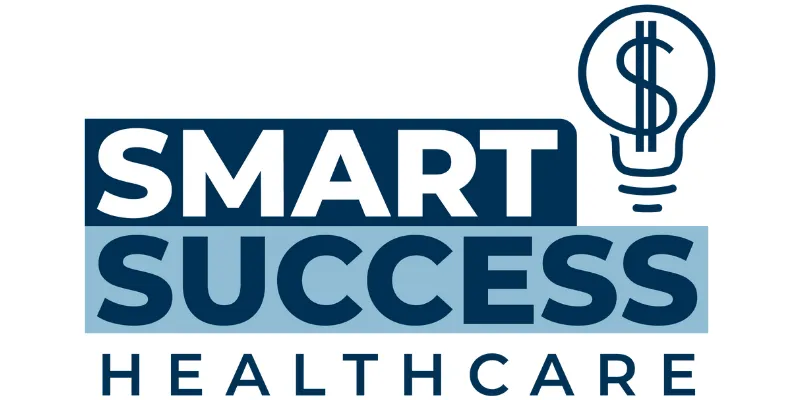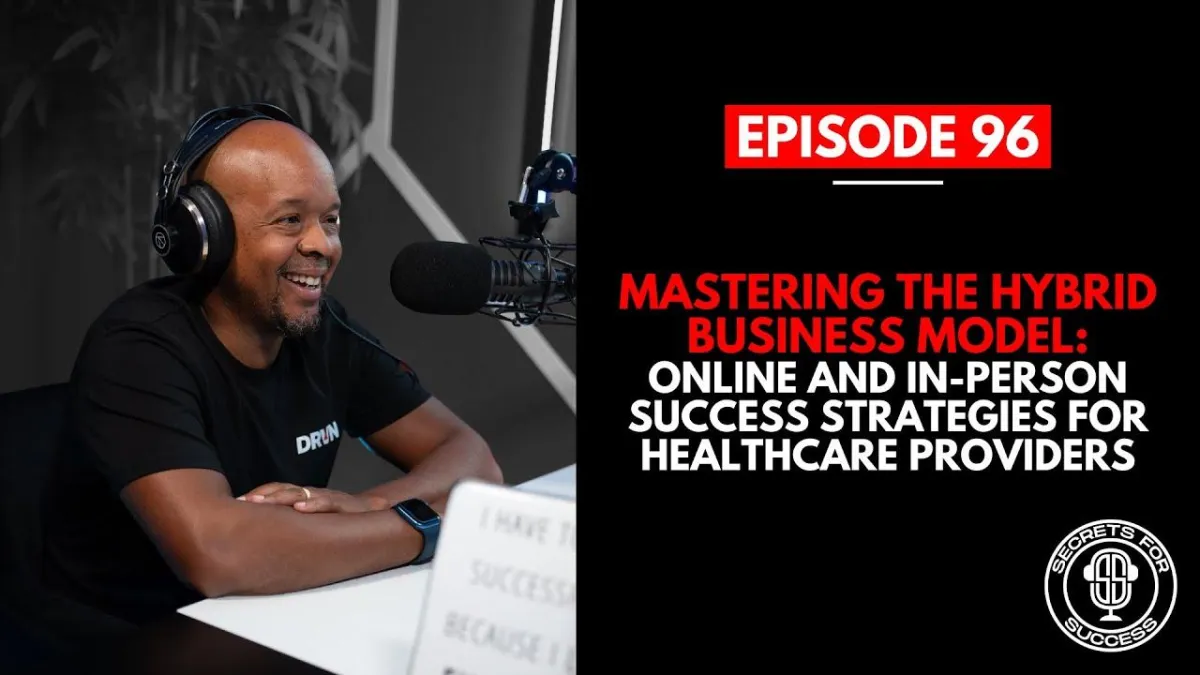
BLOG

Mastering the Hybrid Model: Online & In-Person Success for Healthcare
Navigating the Hybrid Business Model in Healthcare: Strategies for Success
In recent years, the healthcare industry has been rapidly evolving, driven by technological advancements and changing patient preferences. In Episode 96 of SSHC, guest Jake Edling and host Greg delve into the intricacies of merging online and offline business models to create impactful and sustainable healthcare practices. This blog post explores key takeaways from their conversation, providing actionable insights for healthcare professionals looking to navigate the hybrid business model.
The Hybrid Business Model: Bridging Online and In-Person Interactions
The hybrid business model emphasizes the importance of combining digital technologies with traditional in-person engagements. Greg's business, for instance, leverages social media platforms like Facebook and Instagram, as well as podcasts, to create an online presence that funnels patients into in-person events and retreats. These intimate online interactions foster trust and create a desire for real-life connections.
For healthcare providers, this model offers a comprehensive approach to patient care, allowing them to extend their reach and impact. By integrating online courses, digital consultations, and community engagement, healthcare professionals can create a seamless experience for patients, blending the best of both worlds.
Target Audiences and Skill Development: Encouraging a Balanced Approach
One of the challenges highlighted is catering to the varying comfort levels with technology among different age groups. Younger audiences are often more tech-savvy but may lack in-person communication skills, while older patients may excel in face-to-face interactions but struggle with digital tools. To address this, healthcare providers should encourage the younger generation to develop strong interpersonal skills and support older adults in enhancing their tech proficiency.
Striking a balance between these skill sets not only broadens the audience base but also ensures that healthcare professionals can engage effectively with all patients, regardless of their technological comfort levels.
Essential Tools for Online Healthcare Businesses
Building and managing an online healthcare business requires a suite of digital tools. Key components include:
Social Media Platforms: Utilize free engagement tools on platforms like Facebook, Instagram, and LinkedIn to connect with patients and disseminate valuable information.
Scheduling Tools: Manage appointments and activities efficiently across various platforms.
CRM Systems: Capture and organize client information to streamline communication and care plans.
Digital Delivery Methods: Offer online courses, downloadable resources, and community forums to engage patients.
Online Payment Platforms: Facilitate secure and convenient transactions for digital services.
Furthermore, ensuring HIPAA compliance is crucial when dealing with patient information online. Greg’s company, for example, uses a white-labeled platform from Go High Level, which adheres to HIPAA standards, costing around $300-$500 per month.
Building Trust Through a Goodwill Bank Account
Creating a "goodwill bank account" by consistently offering valuable free content is a cornerstone of Greg's strategy. This approach builds trust, confidence, and clarity among patients, making them more likely to invest in paid services. Providing helpful tools and information without immediate expectations of payment fosters a sense of reciprocity and value, establishing a positive foundation for future transactions.
Creating and Promoting Digital Products
Healthcare professionals can leverage their existing knowledge to develop online products, such as courses or e-books. The key is to understand and clearly articulate the results these products will provide and the problems they aim to solve. Testing these concepts with a small beta group before a full launch can prevent wasted time and ensure the product meets market needs.
When it comes to promoting these products, partnerships can be a cost-effective strategy. Collaborating with influencers or businesses that share a similar audience can amplify reach without substantial financial investment. Quality content that keeps viewers engaged further attracts platform support, extending organic reach on social media.
Maintaining Motivation and Avoiding Burnout
Building an online business alongside a traditional practice can be overwhelming. Greg advises starting with the 80/20 rule: dedicating 80% of time to the primary income source and 20% to the passion project. This balanced approach ensures that professionals can develop their online business without compromising their existing responsibilities.
To avoid burnout, Greg suggests focusing on activities that align with personal passions and goals. Engaging in enjoyable and productive tasks reduces the risk of burnout and fosters long-term sustainability.
Conclusion: Creating a Scalable Impact
Embracing a hybrid business model in healthcare not only enhances patient engagement but also creates opportunities for scalable impact. By integrating digital tools and fostering both online and in-person connections, healthcare providers can address varying patient needs and extend their services beyond traditional limitations. Whether it’s through building a goodwill bank account, leveraging digital tools, or maintaining a balanced approach to skill development, the strategies discussed in this episode offer valuable insights for navigating the evolving healthcare landscape.
Watch Greg Todd's Video on Mastering the Hybrid Model: Online & In-Person Success for Healthcare
Follow Greg on Socials:
https://www.Instagram.com/gregtoddpt
https://www.Facebook.com/gregtoddpt

Mastering the Hybrid Model: Online & In-Person Success for Healthcare
Navigating the Hybrid Business Model in Healthcare: Strategies for Success
In recent years, the healthcare industry has been rapidly evolving, driven by technological advancements and changing patient preferences. In Episode 96 of SSHC, guest Jake Edling and host Greg delve into the intricacies of merging online and offline business models to create impactful and sustainable healthcare practices. This blog post explores key takeaways from their conversation, providing actionable insights for healthcare professionals looking to navigate the hybrid business model.
The Hybrid Business Model: Bridging Online and In-Person Interactions
The hybrid business model emphasizes the importance of combining digital technologies with traditional in-person engagements. Greg's business, for instance, leverages social media platforms like Facebook and Instagram, as well as podcasts, to create an online presence that funnels patients into in-person events and retreats. These intimate online interactions foster trust and create a desire for real-life connections.
For healthcare providers, this model offers a comprehensive approach to patient care, allowing them to extend their reach and impact. By integrating online courses, digital consultations, and community engagement, healthcare professionals can create a seamless experience for patients, blending the best of both worlds.
Target Audiences and Skill Development: Encouraging a Balanced Approach
One of the challenges highlighted is catering to the varying comfort levels with technology among different age groups. Younger audiences are often more tech-savvy but may lack in-person communication skills, while older patients may excel in face-to-face interactions but struggle with digital tools. To address this, healthcare providers should encourage the younger generation to develop strong interpersonal skills and support older adults in enhancing their tech proficiency.
Striking a balance between these skill sets not only broadens the audience base but also ensures that healthcare professionals can engage effectively with all patients, regardless of their technological comfort levels.
Essential Tools for Online Healthcare Businesses
Building and managing an online healthcare business requires a suite of digital tools. Key components include:
Social Media Platforms: Utilize free engagement tools on platforms like Facebook, Instagram, and LinkedIn to connect with patients and disseminate valuable information.
Scheduling Tools: Manage appointments and activities efficiently across various platforms.
CRM Systems: Capture and organize client information to streamline communication and care plans.
Digital Delivery Methods: Offer online courses, downloadable resources, and community forums to engage patients.
Online Payment Platforms: Facilitate secure and convenient transactions for digital services.
Furthermore, ensuring HIPAA compliance is crucial when dealing with patient information online. Greg’s company, for example, uses a white-labeled platform from Go High Level, which adheres to HIPAA standards, costing around $300-$500 per month.
Building Trust Through a Goodwill Bank Account
Creating a "goodwill bank account" by consistently offering valuable free content is a cornerstone of Greg's strategy. This approach builds trust, confidence, and clarity among patients, making them more likely to invest in paid services. Providing helpful tools and information without immediate expectations of payment fosters a sense of reciprocity and value, establishing a positive foundation for future transactions.
Creating and Promoting Digital Products
Healthcare professionals can leverage their existing knowledge to develop online products, such as courses or e-books. The key is to understand and clearly articulate the results these products will provide and the problems they aim to solve. Testing these concepts with a small beta group before a full launch can prevent wasted time and ensure the product meets market needs.
When it comes to promoting these products, partnerships can be a cost-effective strategy. Collaborating with influencers or businesses that share a similar audience can amplify reach without substantial financial investment. Quality content that keeps viewers engaged further attracts platform support, extending organic reach on social media.
Maintaining Motivation and Avoiding Burnout
Building an online business alongside a traditional practice can be overwhelming. Greg advises starting with the 80/20 rule: dedicating 80% of time to the primary income source and 20% to the passion project. This balanced approach ensures that professionals can develop their online business without compromising their existing responsibilities.
To avoid burnout, Greg suggests focusing on activities that align with personal passions and goals. Engaging in enjoyable and productive tasks reduces the risk of burnout and fosters long-term sustainability.
Conclusion: Creating a Scalable Impact
Embracing a hybrid business model in healthcare not only enhances patient engagement but also creates opportunities for scalable impact. By integrating digital tools and fostering both online and in-person connections, healthcare providers can address varying patient needs and extend their services beyond traditional limitations. Whether it’s through building a goodwill bank account, leveraging digital tools, or maintaining a balanced approach to skill development, the strategies discussed in this episode offer valuable insights for navigating the evolving healthcare landscape.
Watch Greg Todd's Video on Mastering the Hybrid Model: Online & In-Person Success for Healthcare
Follow Greg on Socials:
https://www.Instagram.com/gregtoddpt
https://www.Facebook.com/gregtoddpt
Join us on our Social Media
platforms to learn and grow with Smart Success Healthcare
We help Physical Therapists, Occupational Therapists, Dietitians and Chiropractors achieve multi 6 to 7 figures per month with few staff, happy patients and great results!

Text us at 813-534-6453 or
© 2024 Smart Success Healthcare







